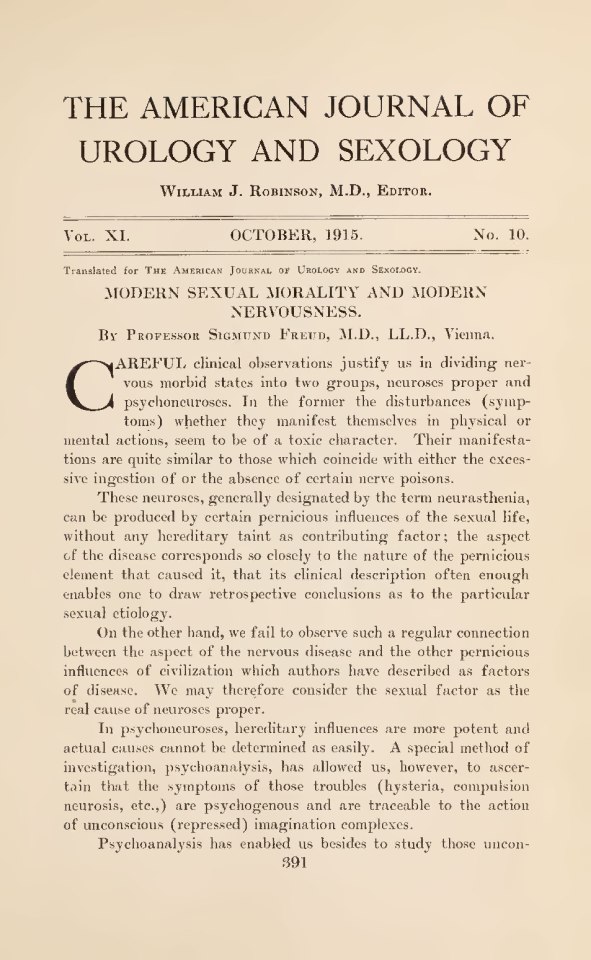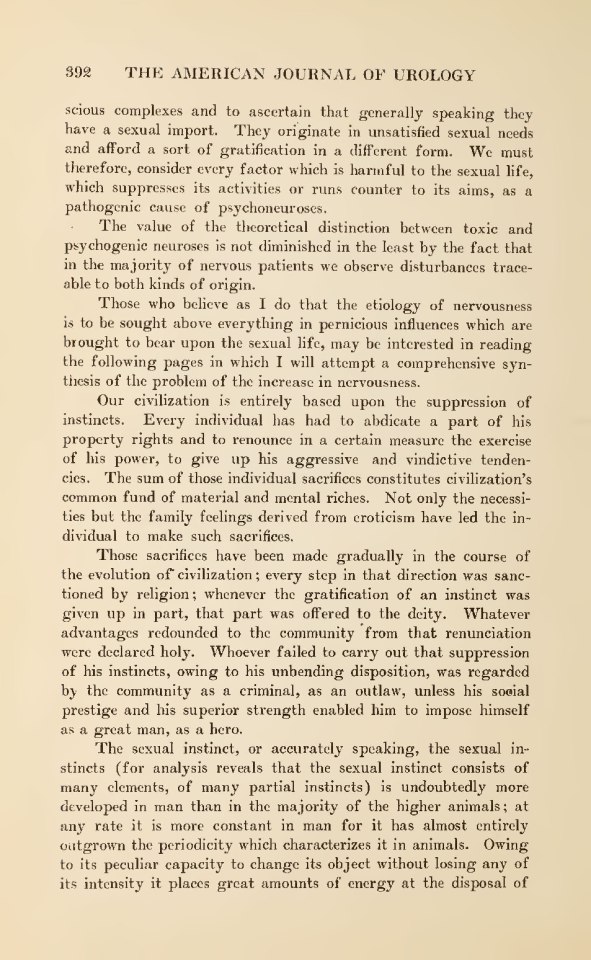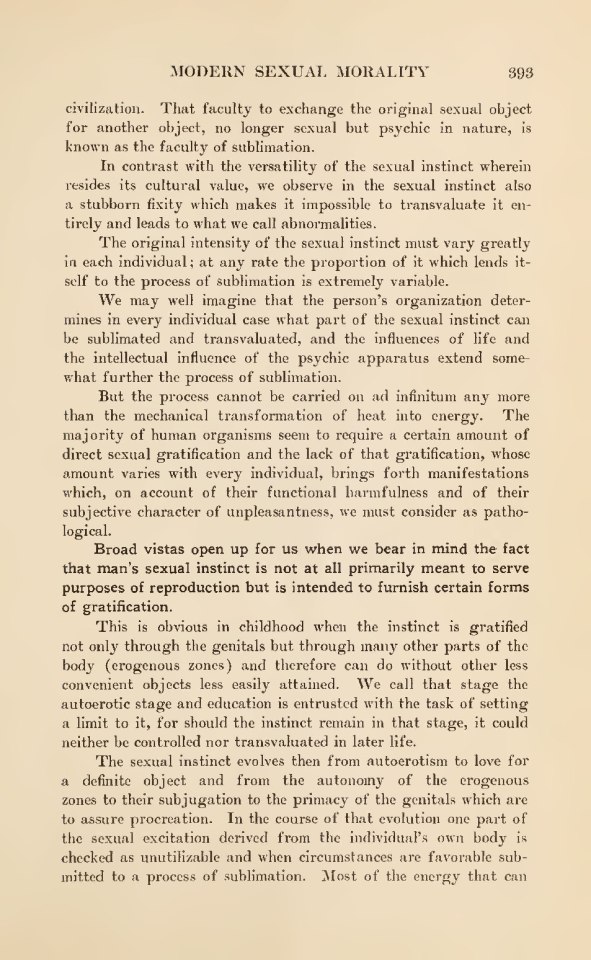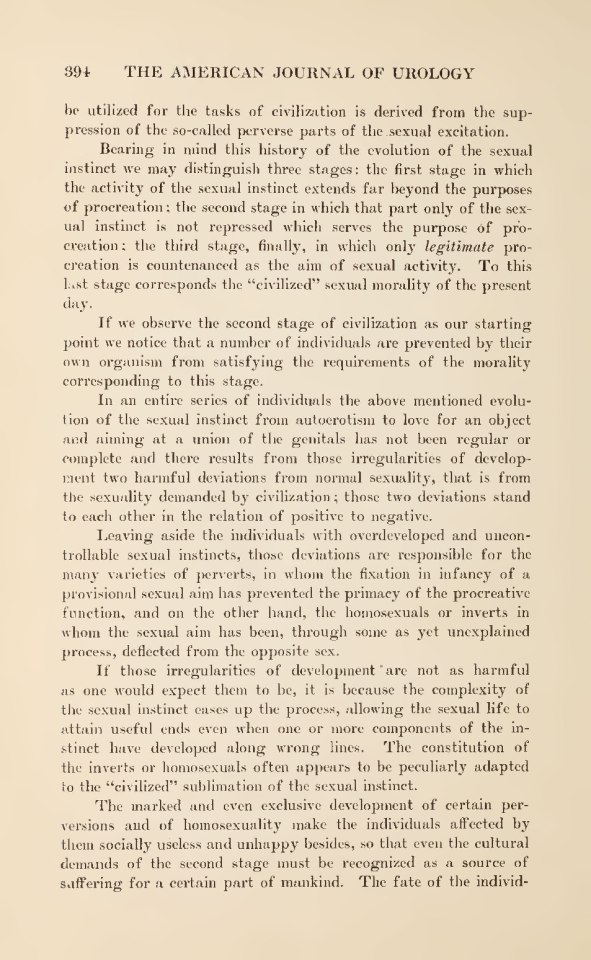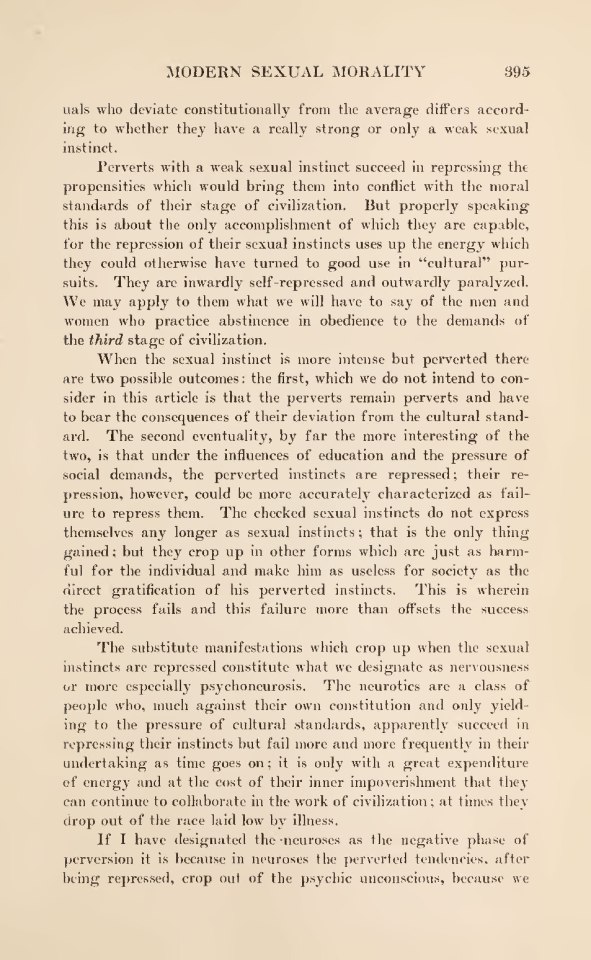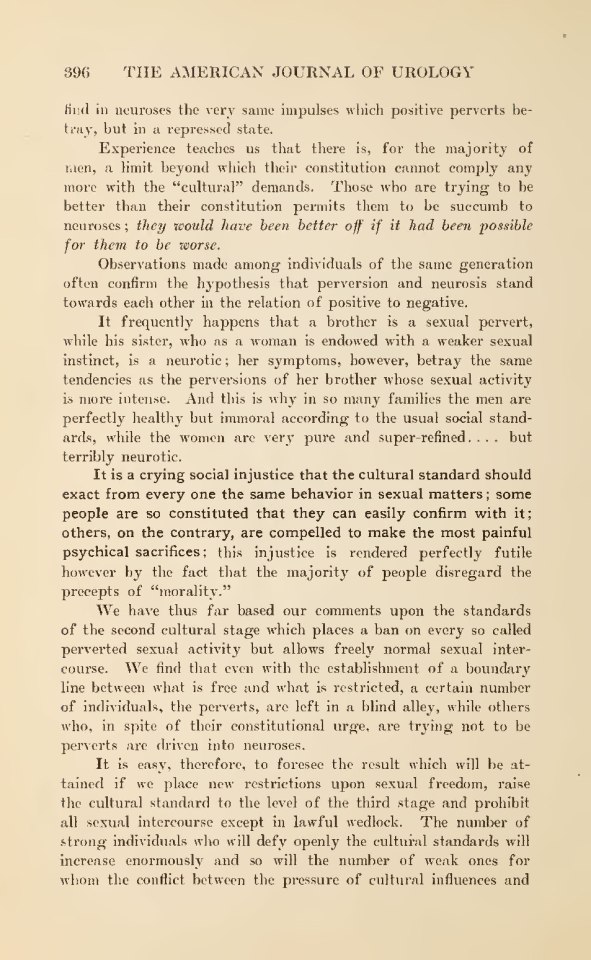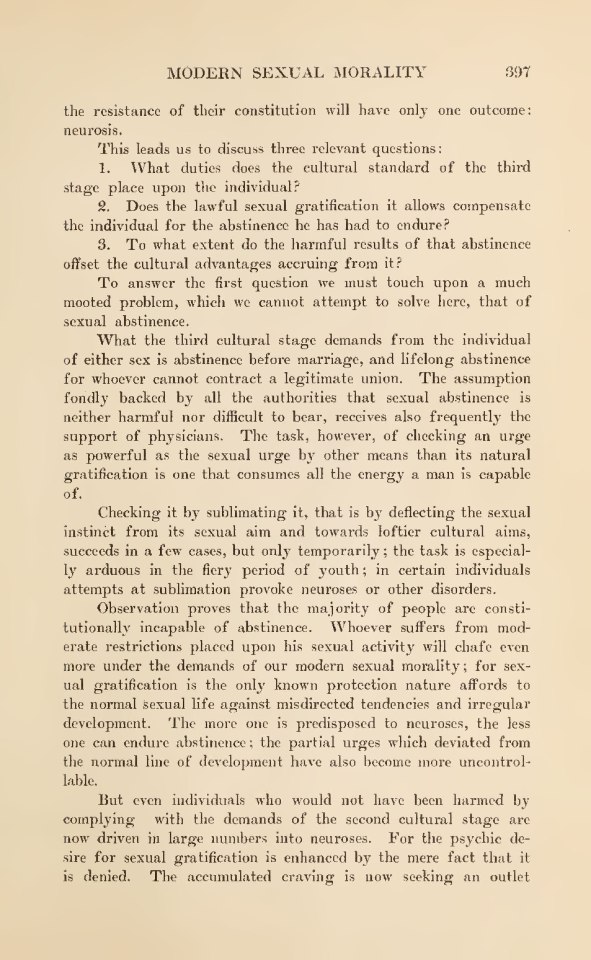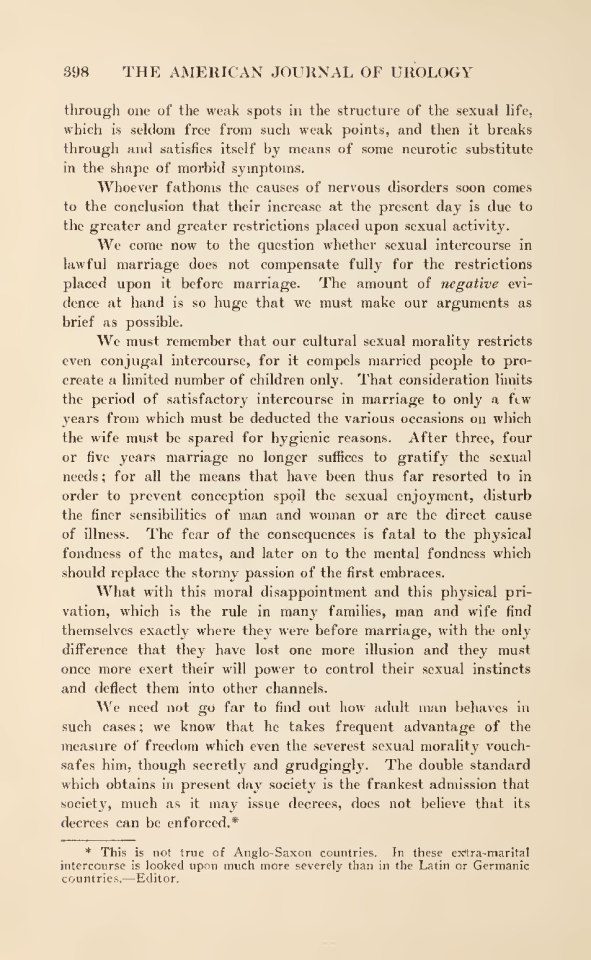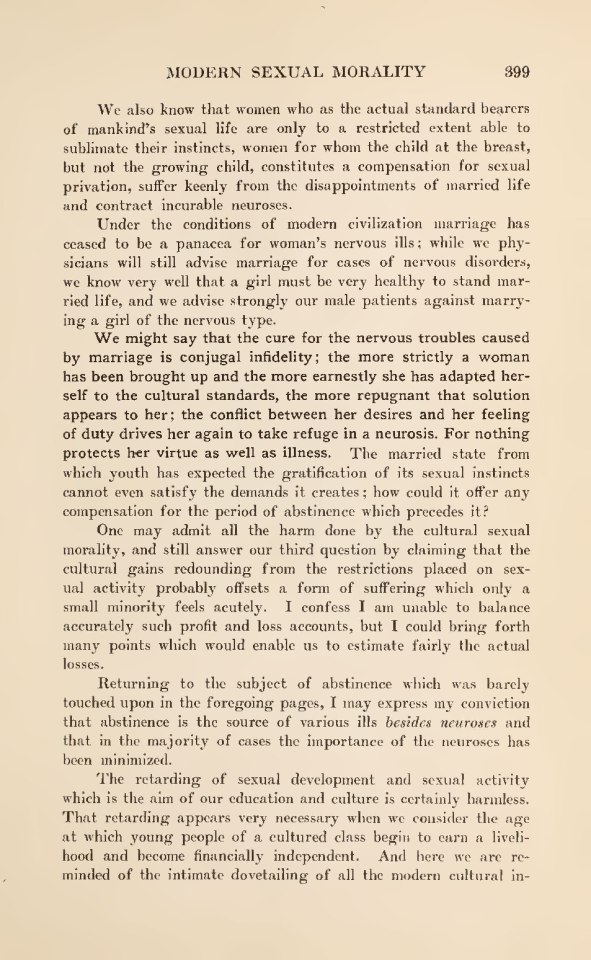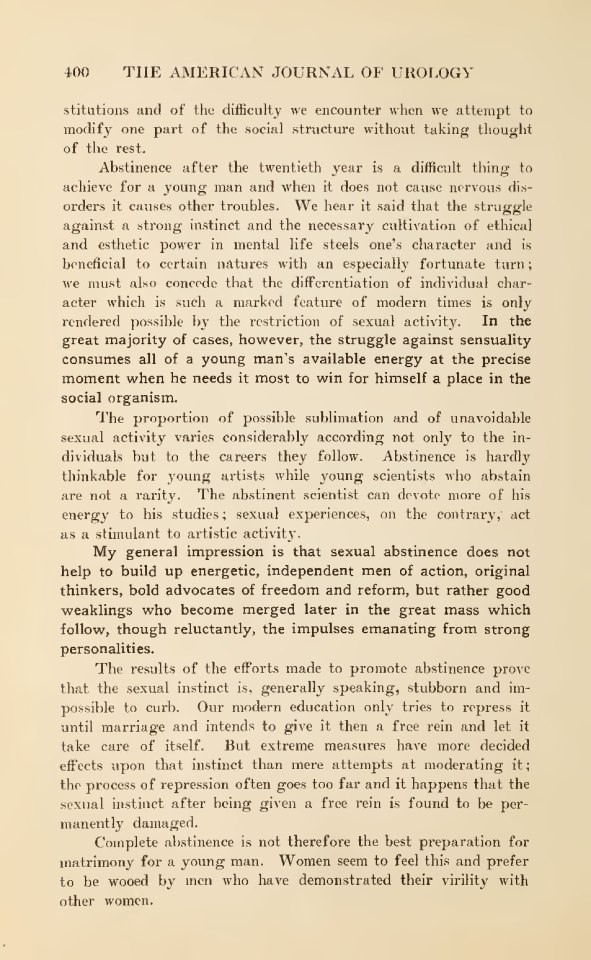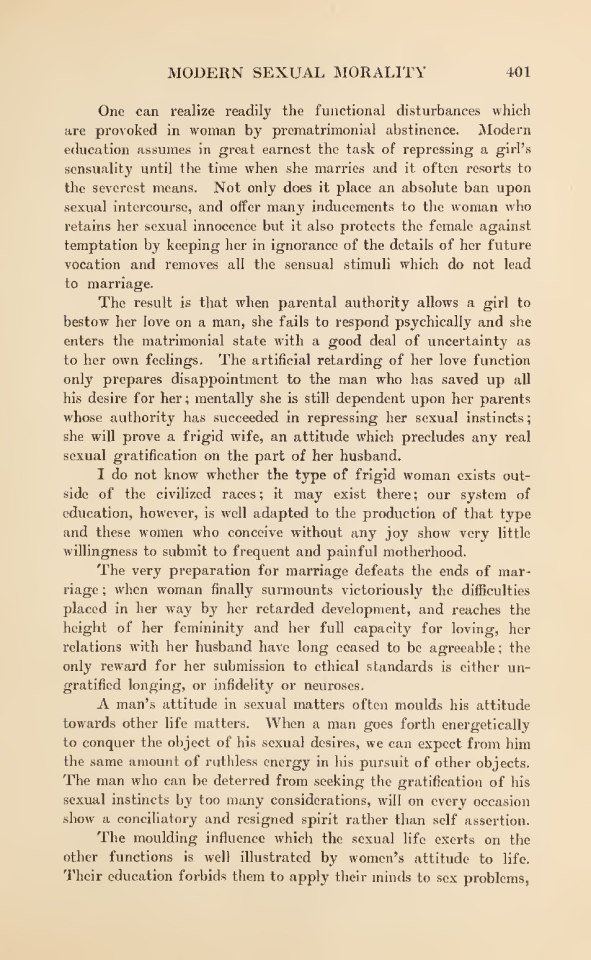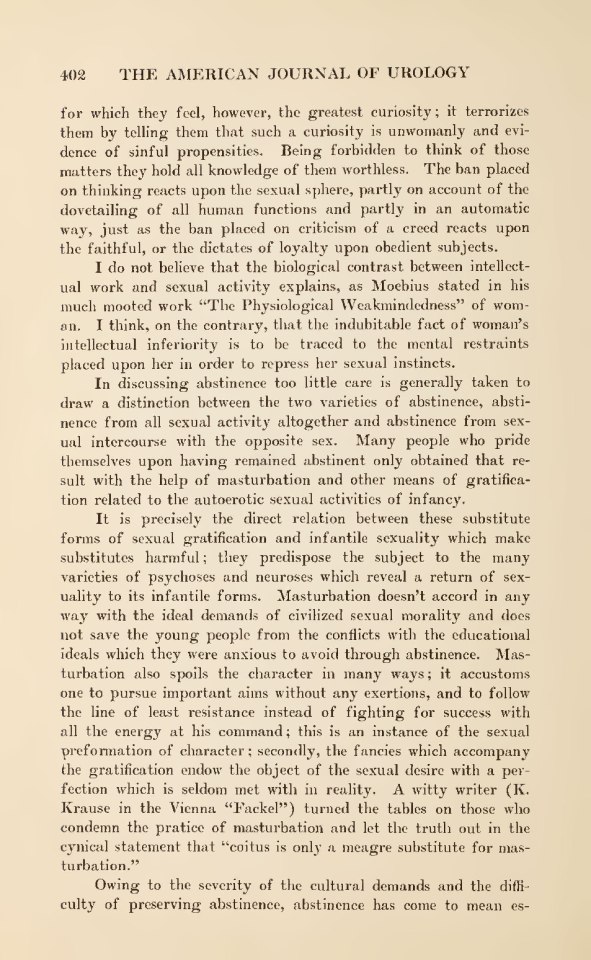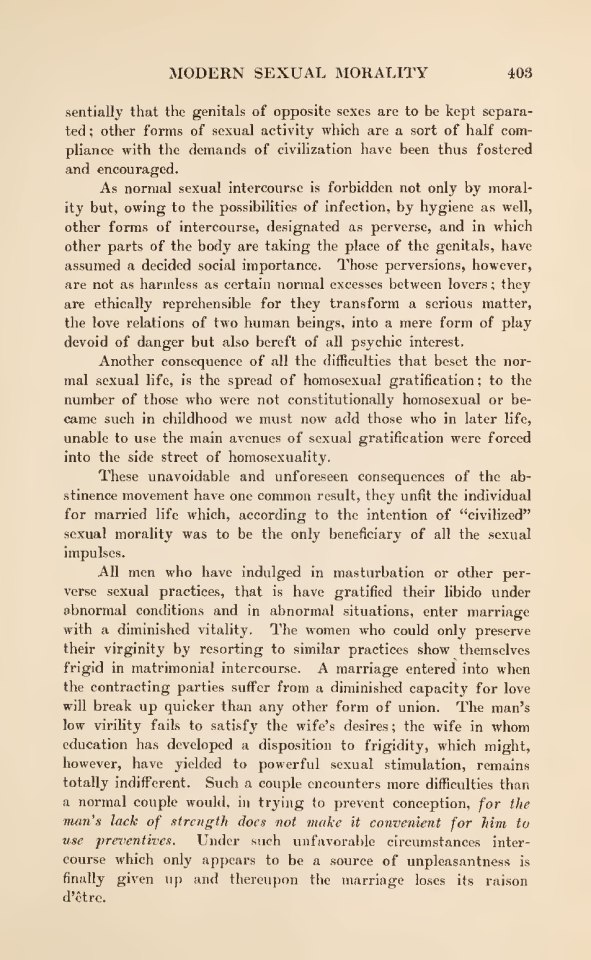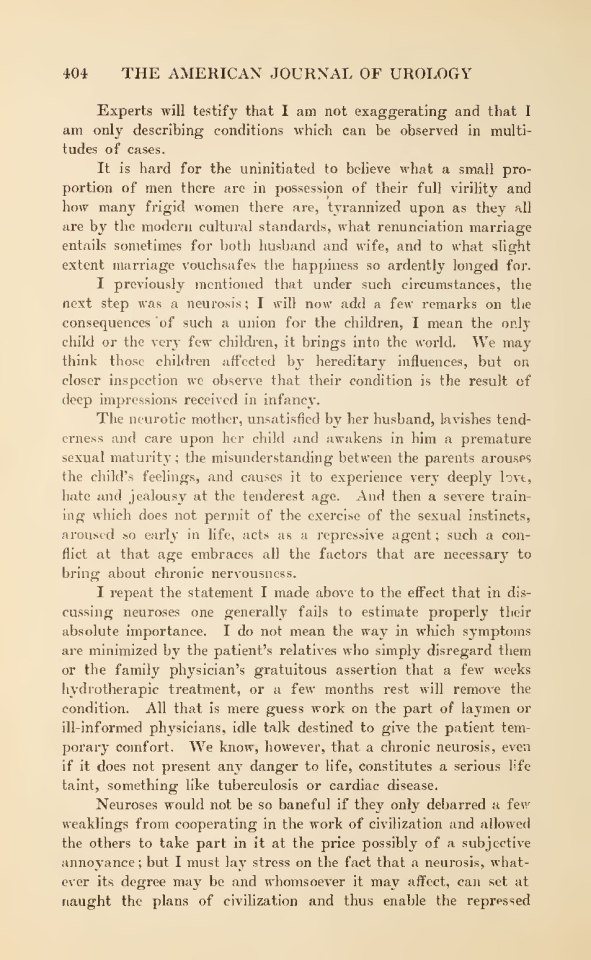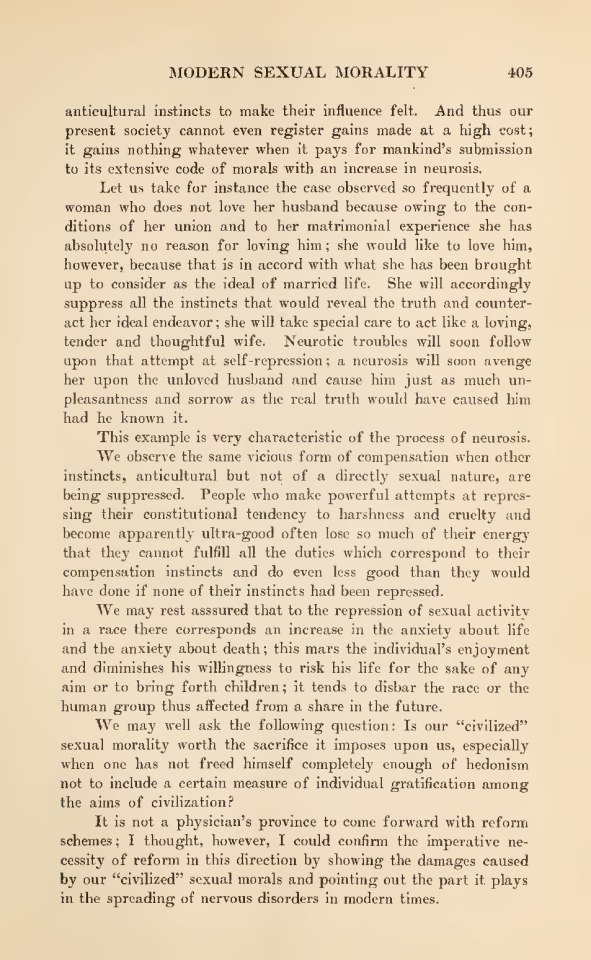S.
THE AMERICAN JOURNAL OF
UROLOGY AND SEXOLOGYWILLIAM J. RoBinson, M.D., Eprron.
Vern XI. OCTOBER, 1915. No. 10.
Translated for THE AMERICAN JOURNAL OF UROLOGY AND SEXOLOGY.
MODERN SEXUAL MORALITY AND MODERN
NERVOUSNESS.By Proressor SIGMUND FREUD, M.D., LL.D., Vienna.
vous morbid states into two groups, neuroses proper and
psychoncuroses. Tn the former the disturbances (symp-
toms) whether they manifest themsclves in physical or
mental actions, seem to be of a toxic character. Their manifesta-
tions are quite similar to those which coincide with either the exces-
sive ingestion of or the absence of certain nerve poisons.These neuroses, generally designated by the term neurasthenia,
can be produced by certain pernicious influences of the sexual life,
without any hereditary taint as contributing factor; the aspect
of the disease corresponds so closely to the nature of the pernicious
element that caused it, that its clinical description often enough
enables one to draw retrospective conclusions as to the particular
sexual ctiology.On the other hand, we fail to observe such a regular connection
betwecn the aspect of the nervous disease and the other pernicious
influences of civilization which authors have described as factors
of disease. We may therefore consider the sexual factor as the
real cause of neuroses proper.© clinical observations justify us in dividing ner-
In psychoneuroses, hereditary influences are more potent and
actual causes cannot be determined as easily. A special method of
investigation, psychoanalysis, has allowed us, however, to ascer-
tain that the symptoms of those troubles (hysteria, compuision
neurosis, ete.,) are psychogenous and are traceable to the action
of unconscious (repressed) imagination complexes.Psychoanalysis has enabled us besides to study those uncon-
391
S.
392 THE AMERICAN JOURNAL OF UROLOGY
scious complexes and to ascertain that generally speaking they
have a sexual import. They originate in unsatisfied sexual nceds
and afford a sort of gratification in a different form. We must
therefore, consider every factor which is harmful to the sexual life,
which suppresses its activities or runs counter to its aims, as a
pathogenic cause of psychoneuroses,The value of the theoretical distinction between toxic and
psy chogenie neuroses is not diminished in the least by the fact that
in the majority of nervous patients we observe disturbances trace-
able to both kinds of origin.Those who belicve as I do that the etiology of nervousness
is to be sought above everything in pernicious influences which are
brought to bear upon the sexual life, may be interested in reading
the following pages in which I will attempt a comprehensive syn-
thesis of the problem of the increase in nervousness.Our civilization is entirely based upon the suppression of
instincts. Every individual has had to abdicate a part of his
property rights and to renounce in a certain measurc the exercise
of his power, to give up his aggressive and vindictive tenden-
cies. The sum of those individual sacrifices constitutes civilization's
cemmon fund of material and mental riches. Not only the necessi-
ties but the family feelings derived from croticism have led the in-
dividual to make such sacrifices.Those sacrifices have been made gradually in the course of
the evolution of civilization ; every step in that direction was sanc-
tioned by religion; whenever the gratification of an instinct was
given up in part, that part was offered to the deity. Whatever
advantages redounded to the community from that renunciation
were declared holy. Whoever failed to carry out that suppression
of his instincts, owing to his unbending disposition, was regarded
by the community as a criminal, as an outlaw, unless his soeial
prestige and his superior strength enabled him to impose himself
as a great man, as a hero.The sexual instinct, or accurately speaking, the sexual in-
stincts (for analysis reveals that the sexual instinct consists of
many clements, of many partial instincts) is undoubtedly more
developed in man than in the majority of the higher animals; at
any rate it is more constant in man for it has almost entirely
outgrown the periodicity which characterizes it in animals. Owing
to its peculiar capacity to change its object without losing any of
its intensity it places great amounts of energy at the disposal ofS.
MODERN SEXUAL MORALITY 393
civilization. That faculty to exchange the original sexual object
for another object, no longer sexual but psychic in nature, is
known as the faculty of sublimation.In contrast with the versatility of the sexual instinct wherein
resides its cultural value, we observe in the sexual instinct also
a stubborn fixity which makes it impossible to transvaluate it en-
tirely and leads to what we call abnormalities.The original intensity of the sexual instinct must vary greatly
in each individual; at any rate the proportion of it which lends it-
self to the process of sublimation is extremely variable.We may well imagine that the person’s organization deter-
mines in every individual case what part of the sexual instinct can
be sublimated and transvaluated, and the influences of life and
the intellectual influence of the psychic apparatus extend some-
what further the process of sublimation.But the process cannot be carried on ad infinitum any more
than the mechanical transformation of heat into cnergy. The
majority of human organisms seem to require a certain amount of
direct sexual gratification and the lack of that gratification, whose
amount varies with every individual, brings forth manifestations
which, on account of their functional harmfulness and of their
subjective character of unpleasantness, we must consider as patho-
logical.Broad vistas open up for us when we bear in mind the fact
that man's sexual instinct is not at all primarily meant to serve
purposes of reproduction but is intended to furnish certain forms
of gratification.This is obvious in childhood when the instinet is gratified
not only through the genitals but through many other parts of the
body (erogenous zones) and therefore can do without other less
convenient objects less easily attained. We call that stage the
autoerotic stage and education is entrusted with the task of setting
a limit to it, for should the instinct remain in that stage, it could
neither be controlled nor transvaluated in later life.The sexual instinct evolves then from autoerotism to love for
a definite object and from the autonomy of the erogenous
zones to their subjugation to the primacy of the genitals which are
to assure procreation. In the course of that evolution ane part of
the sexual excitation derived from the individuals own body is
checked as unutilizable and when circumstances are favorable sub-
mitted to a process of sublimation. Most of the energy that canS.
394 THE AMERICAN JOURNAL OF UROLOGY
be utilized for the tasks of civilization is derived from the sup-
pression of the so-called perverse parts of the sexual excitation.Bearing in mind this history of the cvolution of the sexual
instinct we may distinguish three stages: the first stage in which
the activity of the sexual instinct extends far beyond the purposes
of procreation; the second stage in which that part only of the sex-
ual instinet is not repressed which serves the purpose of pro-
creation: the third stage, finally, in which only legitimate pro-
creation is eountenanced as the aim of sexual activity. To this
lust stage corresponds the “civilized” sexual morality of the present
day.If we observe the second stage of civilization as our starting
point we notice that a number of individuals are prevented by their
own organism from satisfying the requirements of the morality
corresponding to this stage.In an entire series of individuals the above mentioned evolu-
tion of the sexual instinct from autoerotism to love for an object
and aiming at a union of the genitals has not been regular or
complete and there results from those irregularities of develop-
vient two harmful deviations from normal sexuality, that is from
the sexuality demanded by civilization; those two deviations stand
to each other in the relation of positive to negative.Leaving aside the individuals with overdeveloped and uncon-
trollable sexual instinets, those deviations are responsible for the
many varieties of perverts, in whom the fixation in infancy of a
provisional sexual aim has prevented the primacy of the procreative
function, and on the other hand, the homosexuals or inverts in
whom the sexual aim has been, through some as yet unexplained
process, deflected from the opposite sex.If those irregularities of development are not as harmful
as one would expect them to be, it is because the complexity of
the sexual instinet cases up the process, allowing the sexual life to
attain useful ends even when one or more components of the in-
stinet have developed along wrong lines. "Phe constitution of
the inverts or homosexuals often appears to be peculiarly adapted
to the “civilized” sublimation of the sexual instmet.The marked and cven exclusive development of certain per-
versions and of homosexuality make the individuals affected by
them socially useless and unhappy besides, so that even the cultural
demands of the second stage must be recognized as a source of
suffering for a certain part of mankind. The fate of the individ-S.
MODERN SEXUAL MORALITY 395
uals who deviate constitutionally from the average differs accord-
ing to whether they have a really strong or only a weak sexual
instinct.Perverts with a weak sexual instinct succeed in repressing the
propensities which would bring them into conflict with the moral
standards of their stage of civilization. But properly speaking
this is about the only accomplishment of which they are capable,
for the repression of their sexual instincts uses up the energy which
they could otherwise have turned to good use in “cultural” pur-
suits. They are inwardly self-repressed and outwardly paralyzed.
We may apply to them what we will have to say of the men and
women who practice abstinence in obedience to the demands of
the third stage of civilization.When the sexual instinct is more intense but perverted there
are two possible outcomes: the first, which we do not intend to con-
sider in this article is that the perverts remain perverts and have
to bear the consequences of their deviation from the cultural stand-
ard. The second eventuality, by far the more interesting of the
two, 1s that under the influences of education and the pressure of
social demands, the perverted instincts are repressed; their re-
pression, however, could be more accurately characterized as fail-
ure to repress them. The checked sexual instincts do not express
themselves any longer as sexual instincts: that is the only thing
gained; but they crop up in other forms which are just as harm-
ful for the individual and make him as useless for society as the
direct gratification of his perverted instincts. “This is wherein
the process fails and this failure more than offsets the success
achieved."The substitute manifestations which crop up when the sexual
instinets are repressed constitute what we designate as nervousness
ss of
people who, much against their own constitution and only yield-
ing to the pressure of cultural standards, apparently succeed in
repressing their instinets but fail more and more frequently in their
undertaking as time goes on; it is only with a great expenditureur more especially psychoncurosis. The neurotics are a c
ef energy and at the cost of their inner impoverishment that they
can continue to collaborate in the work of civilization: at times theydrop out of the race laid low by illne
If I have designated the neuroses as the negative phase of
perversion it is because in neuroses the perverted tendencies. afterbeing repressed, crop out of the psychic unconscious, because we
S.
896 THE AMERICAN JOURNAL OF UROLOGY
find in neuroses the very same impulses which positive perverts be-
tray, but in a repressed state.Experience teaches us that there is, for the majority of
rien, ה limit beyond which their constitution cannot comply any
more with the “cultural” demands. “Those who are trying to he
better than their constitution permits them to be succumb to
neuroses ; they would have been better off if it had been possible
for them to be worse.Observations made among individuals of the same generation
often confirm the hypothesis that perversion and neurosis stand
towards each other in the relation of positive to negative,It frequently happens that a brother is a sexual pervert,
while his sister, who as a woman is endowed with a weaker sexual
instinct, is a neurotic; her symptoms, however, betray the same
tendencies as the perversions of her brother whose sexual activity
is more intense. And this is why in so many families the men are
perfectly healthy but immoral according to the usual social stand-
ards, while the women are very pure and super-refined.... but
terribly neurotic.It is a crying social injustice that the cultural standard should
exact from every one the same behavior in sexual matters; some
people are so constituted that they can easily confirm with it;
others, on the contrary, are compelled to make the most painful
psychical sacrifices; this injustice is rendered perfectly futile
however hy the fact that the majority of people disregard the
precepts of “morality.”We have thus far based our comments upon the standards
of the second cultural stage which places a ban on every so called
perverted sexual activity but allows freely normal sexual inter-
course. We find that even with the establishment of a boundary
line between what is free and what is restricted, a certain number
of individuals, the perverts, arc left in a blind alley, while others
who, in spite of their constitutional urge, are trying not to be
perverts are driven into neuroses.It is easy, therefore, to foresee the result which will be at-
tained if we place new restrictions upon sexual freedom, raise
the cultural standard to the level of the third stage and prohibit
all sexual intercourse except in lawful wedlock. The number of
strong individuals who will defy openly the cultural standards will
increase enormously and so will the number of weak ones for
whom the conflict between the pressure of cultural influences andS.
MODERN SEXUAL MORALITY 397
the resistance of their constitution will have only one outcome:
neurosis.This leads us to discuss three relevant questions:
1. What duties does the cultural standard of the third
stage place upon the individual?2. Does the lawful sexual gratification it allows compensate
the individual for the abstinence he has had to endure?3. To what extent do the harmful results of that abstinence
offset the cultural advantages accruing from it?To answer the first question we must touch upon a much
mooted problem, which we cannot attempt to solve here, that of
sexual abstinence.What the third cultural stage demands from the individual
of either scx is abstinence before marriage, and lifelong abstinence
for whoever cannot contract a legitimate union. The assumption
fondly backed by all the authorities that sexual abstinence is
neither harmful nor difficult to bear, reccives also frequently the
support of physicians. The task, however, of checking an urge
as powerful as the sexual urge by other means than its natural
gratification is one that consumes all the cnergy a man is capable
of.Checking it by sublimating it, that is by deflecting the sexual
instinct. from its sexual aim and towards loftier cultural aims,
succeeds in a few cases, but only temporarily ; the task is especial-
ly arduous in the fiery period of youth; in certain individuals
attempts at sublimation provoke neuroses or other disorders.Observation proves that the majority of people are consti-
tutionally incapable of abstinence. Whoever suffers from mod-
erate restrictions placed upon his sexual activity will chafe even
more under the demands of our modern sexual morality; for sex-
ual gratification is the only known protection nature affords to
the normal sexual life against misdirected tendencies and irregular
development. “The more one is predisposed to neuroses, the less
one can endure abstinence; the partial urges which deviated from
the normal line of development have also become more uncontrol-
lable.But even individuals who would not have been harmed by
complying with the demands of the sccond cultural stage are
now driven in large numbers into neuroses. For the psychic de-
sire for sexual gratification is enhanced by the mere fact that it
is denied. The accumulated craving is now seeking an outletS.
398 THE AMERICAN JOURNAL OF UROLOGY
through one of the weak spots in the structure of the sexual life,
which is seldom free from such weak points, and then it breaks
through and satisfies itself by means of some ncurotic substitute
in the shape of morbid symptoms.Whoever fathoms the causes of nervous disorders soon comes
to the conclusion that their increase at the present day is duc to
the greater and greater restrictions placed upon sexual activity.We come now to the question whether sexual intercourse in
lawful marriage does not compensate fully for the restrictions
placed upon it before marriage. The amount of negative evi-
dence at hand is so huge that we must make our arguments as
brief as possible.We must remember that our cultural sexual morality restricts
even conjugal intercourse, for it compels married people to pro-
create a limited number of children only. "That consideration limits
the period of satisfactory intercourse in marriage to only a fewyears from which must be deducted the various occasions on which
the wife must be spared for hygicnie reasons. After three, four
or five years marriage no longer suffices to gratify the sexual
needs; for all the means that have been thus far resorted to in
order to prevent conception spoil the sexual enjoyment, disturb
the finer sensibilities of man and woman or arc the direct cause
of illness. The fear of the consequences is fatal to the physical
fondness of the matcs, and later on to the mental fondness which
should replace the stormy passion of the first embraces.What with this moral disappointment and this physical pri-
vation, which is the rule in many families, man and wife find
themselves exactly where they were before marriage, with the only
difference that they have lost one more illusion and they must
once more exert their will power to control their sexual instincts
and deflect them into other channels.We nced not go far to find out how adult man behaves in
such cases; we know that he takes frequent advantage of the
measure of freedom which even the severest sexual morality vouch-
safes him, though secretly and grudgingly. The double standard
which ebtains in present day society is the frankest admission that
society, much as it may issue decrees, does not believe that its
decrees can be enforced. ®* This is not true of Anglo-Saxon countries. In these extra-marital
intercourse is looked upon much more severely than in the Latin or Germanic
countries Editor.S.
MODERN SEXUAL MORALITY 399
We also know that women who as the actual standard bearers
of mankind’s sexual life are only to a restricted extent able to
sublimate their instincts, women for whom the child at the breast,
but not the growing child, constitutes a compensation for sexual
privation, suffer keenly from the disappointments of married life
and contraet incurable neuroses.Under the conditions of modern civilization marriage has
ceased to be a panacea for woman’s nervous ills; while we phy-
sicians will still advisc marriage for cases of nervous disorders,
we know very well that a girl must be very healthy to stand mar-
ried life, and we advise strongly our male patients against marry-
ing a girl of the nervous type.We might say that the cure for the nervous troubles caused
by marriage is conjugal infidelity; the more strictly a woman
has been brought up and the more earnestly she has adapted her-
self to the cultural standards, the more repugnant that solution
appears to her; the conflict between her desires and her feeling
of duty drives her again to take refuge in a neurosis. For nothing
protects her virtue as well as illness. The married state from
which youth has expected the gratification of its sexual instincts
cannot even satisfy the demands it creates; how could it offer any
compensation for the period of abstinence which precedes it?Onc may admit all the harm done by the cultural sexual
morality, and still answer our third question by claiming that the
cultural gains redounding from the restrictions placed on sex-
ual activity probably offsets a form of suffering which only a
small minority feels acutely. I confess I am unable to balance
accurately such profit and loss accounts, but I could bring forth
many points which would enable us to estimate fairly the actual
losses.Returning to the subject of abstinence which was barely
touched upon in the foregoing pages, I may express my conviction
that abstinence is the source of various ills besides neuroses and
that in the majority of cases the importance of the neuroses has
been minimized.The retarding of sexual development and sexual activity
which is the aim of our education and culture is certainly harmless.
That retarding appears very necessary when we consider the age
at which young people of a cultured class begin to earn a liveli-
hood and become financially independent. And here we are re-
minded of the intimate dovetailing of all the modern cultural in-S.
400 TIIE AMERICAN JOURNAL OF UROLOGY
stitutions and of the difficulty we encounter when we attempt to
modify one part of the social structure without taking thought
of the rest.Abstinence after the twentieth year is a difficult thing to
achieve for a young man and when it does not cause nervous dis-
orders it causes other troubles. We hear it said that the struggle
against a strong instinct and the necessary cultivation of ethical
and esthetic power in mental life steels one’s character and is
beneficial to certain natures with an especially fortunate turn;
we must also concede that the differentiation of individual char-
acter which is such a marked feature of modern times is only
rendered possible by the restriction of sexual activity. In the
great majority of cases, however, the struggle against sensuality
consumes all of a young man’s available energy at the precise
moment when he needs it most to win for himself a place in the
social organism,The proportion of possible sublimation and of unavoidable
sexual activity varies considerably according not only to the in-
dividuals but to the careers they follow. Abstinence is hardly
thinkable for young artists while young scientists who abstain
are not a rarity. The abstinent scientist can devote more of his
energy to his studies; sexual experiences, on the contrary, act
as a stimulant to artistic activity.My general impression is that sexual abstinence does not
help to build up energetic, independent men of action, original
thinkers, bold advocates of freedom and reform, but rather good
weaklings who become merged later in the great mass which
follow, though reluctantly, the impulses emanating from strong
personalities.The results of the efforts made to promote abstinence prove
that the sexual instinct is, generally speaking, stubborn and im-
possible to curb. Our modern education only tries to repress it
until marriage and intends to give it then a free rein and let it
take care of itself. But extreme mensures have more decided
effects upon that instinet than mere attempts at moderating it;
the process of repression often goes too far and it happens that the
sexual instinet after being given a free rein is found to be per-manently damaged.
Complete abstinence is not therefore the best preparation for
matrimony for a young man. Women seem to feel this and prefer
to be wooed by men who have demonstrated their virility withother women,
S.
MODERN SEXUAL MORALITY 401
One can realize readily the functional disturbances which
are provoked in woman by prematrimonial abstinence. Modern
education assumes in great earnest the task of repressing a girl's
sensuality until the time when she marries and it often resorts to
the severest means. Not only does it place an absolute ban upon
sexual intercourse, and offer many inducements to the woman who
retains her sexual innocence but it also protects the female against
temptation by keeping her in ignorance of the details of her future
vocation and removes all the sensual stimuli which do not lead
to marriage.The result is that when parental authority allows a girl to
bestow her love on a man, she fails to respond psychically and she
enters the matrimonial state with a good deal of uncertainty as
to her own feelings. "The artificial retarding of her love function
only prepares disappointment to the man who has saved up all
his desire for her; mentally she is still dependent upon her parents
whose authority has succeeded in repressing her sexual instinets;
she will prove a frigid wife, an attitude which precludes any real
sexual gratification on the part of her husband.I do not know whether the type of frigid woman exists out-
side of the civilized races; it may exist there; our system of
education, however, is well adapted to the prøduction of that type
and these women who conceive without any joy show very little
willingness to submit to frequent and painful motherhood.‘The very preparation for marriage defeats the ends of mar-
riage; when woman finally surmounts victoriously the difficulties
placed in her way by her retarded development, and reaches the
height of her femininity and her full capacity for loving, her
relations with her husband have long ceased to be agreeable; the
only reward for her submission to ethical standards is either un-
gratified longing, or infidelity or neuroses.A man’s attitude in sexual matters often moulds his attitude
towards other life matters. When a man goes forth energetically
to conquer the object of his sexual desires, we can expect from him
the same amount of ruthless energy in his pursuit of other objects.
The man who can be deterred from sceking the gratification of his
sexual instincts by too many considerations, will on every occasion
show a conciliatory and resigned spirit rather than self assertion.The moulding influence which the sexual life exerts on the
other functions is well illustrated by women’s attitude to life.
Their education forbids them to apply their minds to sex problems,S.
402 THE AMERICAN JOURNAL OF UROLOGY
for which they feel, however, the greatest curiosity; it terrorizes
them by telling them that such a curiosity is unwomanly and evi-
dence of sinful propensities. Being forbidden to think of those
matters they hold all knowledge of them worthless. The ban placed
on thinking reacts upon the sexual sphere, partly on account of the
dovetailing of all human functions and partly in an automatic
way, just as the ban placed on criticism of a creed reacts upon
the faithful, or the dictates of loyalty upon obedient subjects.I do not believe that the biological contrast between intellect-
ual work and sexual activity explains, as Moebius stated in his
much mooted work “The Physiological Weakmindedness” of wom-
an. I think, on the contrary, that the indubitable fact of woman’s
intellectual inferiority is to be traced to the mental restraints
placed upon her in order to repress her sexual instincts.In discussing abstinence too little care is generally taken to
draw a distinction between the two varieties of abstinence, absti-
nence from all sexual aetivity altogether and abstinence from sex-
ual intercourse with the opposite sex. Many people who pride
themselves upon having remained abstinent only obtained that re-
sult with the help of masturbation and other means of gratifica-
tion related to the autoerotic sexual activities of infancy.It is precisely the direct relation between these substitute
forms of sexual gratification and infantile sexuality which make
substitutes harmful; they predispose the subject to the many
varicties of psychoses and neuroses which reveal a return of sex-
uality to its infantile forms. Masturbation doesn’t accord in any
way with the ideal demands of civilized sexual morality and does
not save the young people from the conflicts with the educational
ideals which they were anxious to avoid through abstinence. Mas-
turbation also spoils the character in many ways; it accustoms
one to pursue important aims without any exertions, and to follow
the line of least resistance instead of fighting for success with
all the energy at his command; this is an instance of the sexual
preformation of character ; secondly, the fancies which accompany
the gratification endow the object of the sexual desire with a per-
fection which is seldom met with in reality, A witty writer (K.
Krause in the Vienna “Fackel”) turned the tables on those who
condemn the pratice of masturbation and let the truth out in the
cynical statement that “coitus is only a meagre substitute for mas-
turbation.”Owing to the severity of the cultural demands and the diffi-
culty of preserving abstinence, abstinence has come to mean es-S.
MODERN SEXUAL MORALITY 403
sentially that the genitals of opposite sexes are to be kept scpara-
ted; other forms of sexual activity which are a sort of half com-
pliance with the demands of civilization have been thus fostered
and encouraged.As normal sexual intercourse is forbidden not only by moral-
ity but, owing to the possibilities of infection, by hygiene as well,
other forms of intercourse, designated as perverse, and in which
other parts of the body are taking the place of the genitals, have
assumed a decided social importance. Those perversions, however,
are not as harmless as certain normal excesses between lovers; they
are ethically reprchensible for they transform a scrious matter,
the love relations of two human beings, into a mere form of play
devoid of danger but also bereft of all psychic interest.Another consequence of all the difficulties that beset the nor-
mal sexual life, is the spread of homosexual gratification; to the
number of those who were not constitutionally homosexual or be-
came such in childhood we must now add those who in later life,
unable to use the main avenues of sexual gratification were forced
into the side street of homosexuality.These unavoidable and unforeseen consequences of the ab-
stinence movement have one common result, they unfit the individual
for married life which, according to the intention of “civilized”
sexual morality was to be the only beneficiary of all the sexual
impulses.All men who have indulged in masturbation or other per-
verse sexual practices, that is have gratified their libido under
abnormal conditions and in abnormal situations, enter marriage
with a diminished vitality. The women who could only preserve
their virginity by resorting to similar practices show themselves
frigid in matrimonial intercourse. A marriage entered into when
the contracting parties suffer from a diminished capacity for love
will break up quicker than any other form of union. The man’s
low virility fails to satisfy the wife's desires; the wife in whom
education has developed a disposition to frigidity, which might,
however, have yielded to powerful sexual stimulation, remains
totally indifferent. Such a couple cneounters more difficulties than
a normal couple would, in trying to prevent conception, for the
man's lack of strength docs not make it convenient for him to
use preventives. Under such unfavorable circumstances inter-
course which only appears to be a source of unpleasantness is
finally given up and thereupon the marriage loses its raison
d’être.S.
404 THE AMERICAN JOURNAL OF UROLOGY
Experts will testify that I am not exaggerating and that I
am only describing conditions which can be observed in multi-
tudes of cases.It is hard for the uninitiated to believe what a small pro-
portion of men there arc in possession of their full virility and
how many frigid women there are, trrannized upon as they all
are by the Modern cultural standards, what renunciation marriage
entails sometimes for both husband and wife, and to what slight
extent marriage vouchsafes the happiness so ardently longed for.I previously mentioned that under such circumstances, the
next step was a neurosis; I will now add a few remarks on the
consequences ‘of such a union for the children, I mean the only
child or the very few children, it brings into the world. We may
think those children affected by hereditary influences, but on
closer inspection we observe that their condition is the result of
deep impressions received in infancy.The neurotic mother, unsatisfied by her husband, lavishes tend-
erness and care upon her child and awakens in him a premature
sexual maturity ; the misunderstanding between the parents arouses
the child’s feelings, and causes it to experience very deeply love,
hate and jealousy at the tenderest age. And then a severe train-
ing which does not permit of the exercise of the sexual instincts,
aroused so early in life, acts as a repressive agent; such a con-
flict at that age embraces all the factors that are necessary to
bring about chronic nervousness.I repeat the statement I made above to the effect that in dis-
cussing neuroses one generally fails to estimate properly their
absolute importance. I do not mean the way in which symptoms
are minimized by the patient’s relatives who simply disregard them
or the family physician’s gratuitous assertion that a few weeks
hydrotherapic treatment, or a few months rest will remove the
condition. All that is mere guess work on the part of laymen or
ill-informed physicians, idle talk destined to give the patient tem-
porary comfort. We know, however, that a chronic neurosis, even
if it does not present any danger to life, constitutes a serious life
taint, something like tuberculosis or cardiac disease.Neuroses would not be so baneful if they only debarred a few
weaklings from cooperating in the work of civilization and allowed
the others to take part in it at the price possibly of a subjective
annoyance ; but I must lay stress on the fact that a neurosis, what-
ever its degree may be and whomsoever it may affect, can set at
naught the plans of civilization and thus enable the repressedS.
MODERN SEXUAL MORALITY 405
anticultural instincts to make their influence felt. And thus our
present society cannot even register gains made at a high cost;
it gains nothing whatever when it pays for mankind’s submission
to its extensive code of morals with an increase in neurosis.Let us take for instance the case observed so frequently of a
woman who does not love her husband because owing to the con-
ditions of her union and to her matrimonial experience she has
absolutely no reason for loving him; she would like to love him,
however, because that is in accord with what she has been brought
up to consider as the ideal of married life. She will accordingly
suppress all the instincts that would reveal the truth and counter-
act her ideal endeavor; she will take special care to act like a loving,
tender and thoughtful wife. Neurotic troubles will soon follow
upon that attempt at self-repression; a neurosis will soon avenge
her upon the unloved husband and cause him just as much un-
pleasantness and sorrow as the real truth would have caused him
had he known it.This example is very characteristic of the process of neurosis.
We observe the same vicious form of compensation when other
instinets, anticultural but not of a directly sexual nature, are
being suppressed. People who make powerful attempts at repres-
sing their constitutional tendency to harshness and cruelty and
become apparently ultra-good often lose so much of their energy
that they cannot fulfill all the duties which correspond to their
compensation instincts and do even less good than they would
have done if none of their instincts had been repressed.We may rest asssured that to the repression of sexual activity
in a race there corresponds an increase in the anxiety about life
and the anxiety about death; this mars the individual’s enjoyment
and diminishes his willingness to risk his life for the sake of any
alm or to bring forth children; it tends to disbar the race or the
human group thus affected from a share in the future.We may well ask the following question: Is our “civilized”
sexual morality worth the sacrifice it imposes upon us, especially
when one has not freed himself completely enough of hedonism
not to include a certain measure of individual gratification among
the aims of civilization?It is not a physician's province to come forward with reform
schemes; I thought, however, I could confirm the imperative ne-
cessity of reform in this direction by showing the damages caused
by our “civilized” sexual morals and pointing out the part it plays
in the spreading of nervous disorders in modern times.
391
–405
